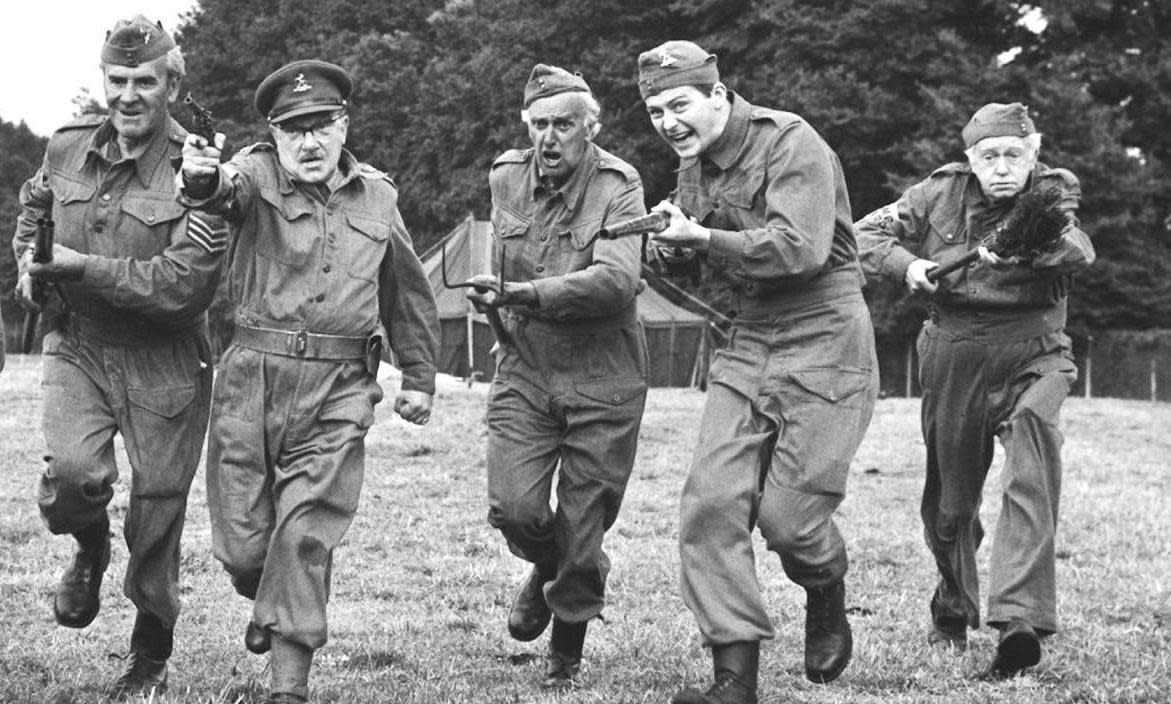‘Don’t tell him, Pike!’ How Ian Lavender gave Dad’s Army its most adored moment

Young actors dream of playing a variety of great roles, but they also fear never being offered one at all. There is, however, a third way: being famed for a single role, in one of the best-loved TV shows ever. This can bring a peculiar blend of attainment and limitation, which many performers would happily settle for.
Ian Lavender, who has died aged 77, took this route with grace and patience as Private Frank Pike, the timid teenage rookie of the Walmington-on-Sea Home Guard in Dad’s Army. Lavender appeared in all 80 episodes from 1968 to 1977, and features in the single most shared moment, when a captured German U-boat officer responds to some schoolboy rudery by ordering the boy soldier to give his name, causing Arthur Lowe’s Captain Mainwaring to bark: “Don’t tell him, Pike!”
So revered is the series that episodes up to 46 years old are still showing on BBC Two and the rerun network Gold. The sitcom continues to be the only classic TV show that has no need to run an episode as a tribute when a lead actor dies – it will be in the schedules anyway – although, poignantly, Lavender is the last of the main actors to be lost.
He was in regular demand on screen and stage and had a later recurring role in EastEnders as Derek Harkinson, an amateur theatre star and old friend of matriarch Pauline Fowler (Wendy Richard) who, as one of the soap’s earliest gay characters, featured in a storyline about homophobia.
But it was Pike who dominated his career, as the actor accepted by giving his benediction to a 2016 movie remake of Dad’s Army. Lavender even appeared as a Brigadier while Blake Harrison flattered him with imitation as the platoon junior.
Pike was a prime example of the meticulous characterisation and visual sense of Dad’s Army writers Jimmy Perry and David Croft. The Home Guard historically contained men too old to be called up for the main army, so the authors needed a plausible reason for young Pike not to be at the front. They found it in asthma and sinus conditions that led him to fail a military medical – a backstory inspiring the huge home-knit scarf that his worried mother insisted he wore on parade and became one of two signature TV scarves (the other being Tom Baker’s in Doctor Who).
Pike is 19 in the opening episode, and Lavender was two years older. After graduating from Bristol Old Vic theatre school, he played “juvenile leads” at the Marlowe theatre in Canterbury, where a TV casting director chose him for another youthful part in a half-hour ITV play, Flowers At My Feet, in 1968.
Croft saw that and liked the actor for Pike. The fact that Croft’s wife, Ann Callender, was Lavender’s agent led both Pike and the BBC to have brief qualms about the casting, but Callender pointed out that the character could always be written out if the actor flopped.
In fact, he made an immediate impact. Though Lavender was the least known member of the ensemble, he shared the first dialogue in the opening episode with Lowe and maintained high levels of screen-time. It helped that, though Pike was frail and puny, Lavender was at least half or a third of the age of his cast-mates, several of whom were in fragile health. Perry and Croft sensibly chose Lavender for drenching, drowning, driving, falling and sporting scenes, maximising his participation.
Pike’s extreme naivety next to the worldly suavity of John Le Mesurier’s Sgt Wilson also made for a strong double-act, with the young man not realising that “Uncle Arthur” is his widowed mother’s secret lover.
The sweet innocence Lavender brought to the part allowed Croft and Perry to smuggle in some of the innuendo they enjoyed in another of their shows, Hi-De-Hi! In The Making of Private Pike, the young squaddie borrows a car to take a woman on a date. When it breaks down, he spends all night trying to get the vehicle home but is winkingly assumed in town to have had a night of passion. “I was pushing and she was steering!” he pleads to Wilson. Lavender and Le Mesurier play the exchange at such perfect cross purposes that Dad’s Army’s status as a family show is never threatened. Lavender told Graham McCann, Dad’s Army’s historian, that it was his favourite scene.
Related: Ian Lavender: ‘Dad’s Army cost me a career in the movies’
And in 1973’s The Deadly Attachment, Pike’s name is inadvertently given to the Germans. It’s rare for actors to be famous for a catchphrase they didn’t say, but the character’s name is the punchline, and the panic about Nazi execution in the event of Allied defeat that races across Lavender’s face is a lesson in how to double a line’s impact with a reaction shot.
In 1976, when the US broadcaster ABC made a pilot for a version of Dad’s Army called The Rear Guard, the episode adapted was The Deadly Attachment. However, because the troop junior was renamed, the punchline became “Don’t tell him, Henderson!” The series was not commissioned and serious scholars of comedy – including the writer-performer Barry Cryer – used this to argue that short, hard syllables are inherently funnier. The writers’ view was that, while “Pike” could be blurted out by Mainwaring without thinking, even a buffoonish figure would realise their mistake and stop short during the three syllables of Henderson.
Whatever the reason, it made the name Pike famous and ensured warm thoughts towards Ian Lavender for as long as Dad’s Army remains loved which, at the moment, seems likely to be for ever.

 Yahoo News
Yahoo News 
